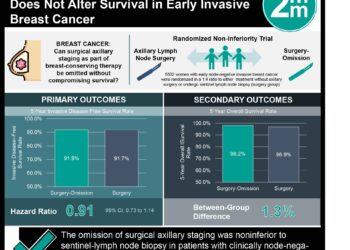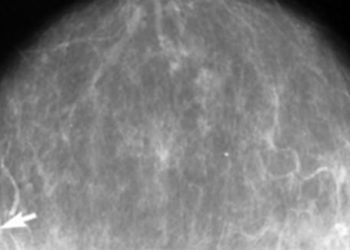Overall Survival with Pembrolizumab in Early-Stage Triple-Negative Breast Cancer
1. The 5-year OS rate for pembrolizumab vs placebo was 86.1% vs 81.7% with HR 0.51 (significant).
2. Immune-mediated adverse events grade 3 or higher occurred in 13.0% with pembrolizumab vs 1.5% with placebo.
Evidence Rating Level: 1 (Excellent)
Study Rundown: Triple-negative breast cancer (TNBC) is an aggressive subtype that lacks key therapeutic targets, leading to poorer outcomes. Pembrolizumab, a PD-1 inhibitor, has shown significant benefits in treating early-stage TNBC. This study is the final analysis for neoadjuvant pembrolizumab plus chemotherapy followed by adjuvant pembrolizumab for high-risk, early-stage triple-negative breast cancer. The primary endpoints included pathological complete response (pCR) and event-free survival (EFS), and secondary outcomes included overall survival (OS) and safety. Estimated OS at 3, 4, and 5 years between the pembrolizumab–chemotherapy group and the placebo–chemotherapy group, respectively, was 89.5% vs 86.9%, 87.8% vs 83.5%, and 86.6% vs 81.7% with HR 0.87 (non-significant) before the 2-year follow-up and 0.51 (significant) afterwards. The estimated 5-year EFS was 81.2% in the pembrolizumab–chemotherapy group vs 72.2% in the placebo–chemotherapy group with HR 0.65 (significant). The pCR data for this study was reported in an earlier analysis. With regards to safety, treatment-related adverse events of grade 3 or higher occurred in 77.1% in the pembrolizumab–chemotherapy group vs 73.3% in the placebo–chemotherapy group, with the most common events being neutropenia, decreased neutrophil count, and anemia. Immune-mediated adverse events grade 3 or higher occurred in 13.0% in the pembrolizumab–chemotherapy group vs 1.5% in the placebo–chemotherapy group, with the most common events being endocrine in nature. The strengths of this study included the methodology, the follow-up period, the number of participants, and the limitations included comparison against other treatment options. Overall, this study found that neoadjuvant/adjuvant pembrolizumab in addition to standard chemotherapy improves overall and event-free survival in high-risk, early-stage triple-negative breast cancer.
Click to read the study in NEJM
Relevant Reading: Pembrolizumab for early triple-negative breast cancer
In-Depth [ randomized controlled trial]: This phase 3, international, double-blind trial enrolled patients with non-metastatic newly diagnosed TNBC and randomized them (2:1) to neoadjuvant pembrolizumab plus chemotherapy followed by adjuvant pembrolizumab (pembrolizumab–chemotherapy group, n=784) or neoadjuvant placebo plus chemotherapy followed by adjuvant placebo (placebo–chemotherapy group, n=390). Neoadjuvant therapy consisted of 4 cycles of pembrolizumab/placebo and paclitaxel+carboplatin+doxorubicin/epirubicin+cyclophosphamide. Adjuvant therapy consisted to up to 9 cycles of pembrolizumab/placebo. Median follow-up time was 75.1 months (65.9 to 84.0). Estimated OS at 3, 4, and 5 years between the pembrolizumab–chemotherapy group and the placebo–chemotherapy group, respectively, was 89.5% (95%CI, 87.1-91.5) vs 86.9% (95%CI, 83.1-89.9), 87.8% (95%CI, 85.3-89.9) vs 83.5% (95%CI, 79.4-86.9), and 86.6% (95%CI, 84.0-88.8) vs 81.7% (95%CI, 77.5-85.2) with HR 0.87 (95%CI, 0.57-1.32) before the 2-year follow-up and 0.51 (95%CI, 0.35-0.75) afterwards. Estimated 5-year EFS was 81.2% (95%CI, 78.3-83.8) in the pembrolizumab–chemotherapy group vs 72.2% (95%CI, 67.4-76.4) in the placebo–chemotherapy group with HR 0.65 (95%CI, 0.51-0.83). The pCR data for this study was reported in an earlier analysis. With regards to safety, treatment-related adverse events of grade 3 or higher occurred in 77.1% in the pembrolizumab–chemotherapy group vs 73.3% in the placebo–chemotherapy group, with the most common events being neutropenia, decreased neutrophil count, and anemia. Immune-mediated adverse events grade 3 or higher occurred in 13.0% in the pembrolizumab–chemotherapy group vs 1.5% in the placebo–chemotherapy group, with most common events being endocrine in nature. Overall, this study found that neoadjuvant/adjuvant pembrolizumab in addition to standard chemotherapy improves overall and event-free survival in high-risk, early-stage triple-negative breast cancer.
Image: PD
©2024 2 Minute Medicine, Inc. All rights reserved. No works may be reproduced without expressed written consent from 2 Minute Medicine, Inc. Inquire about licensing here. No article should be construed as medical advice and is not intended as such by the authors or by 2 Minute Medicine, Inc.







